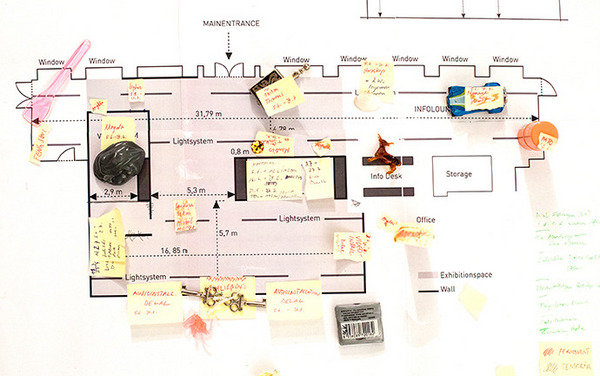Dissent: repetition
dal 4/6/2014 al 24/7/2014
Segnalato da
Angela Strohberger
Carolina Frank
Delal Isci
Denise Fragner
Julischka Stengele
Lina Ruske
Magdalena Fischer
Manuel Carreon Lopez
Marlies Surtmann
Matthias Julian
Mona Hermann
Patrick Wiesauer
Sophie Utikal
Thomas Trabitsch
4/6/2014
Dissent: repetition
Kunstraum Niederoesterreich, Wien
Attempting a regardful practice. Under the thematic focus of 'collaborative work', the Open Class is carrying out an exhibition project. The exhibition room and space are structured by slots, that is, spatial and temporal units that create a curatorial context. In the exhibition the cooperation alongside and with one another is revealed, but so is possible dissent within the Open Class.

Exhibition by the Open Class at the Academy of Fine Arts with:
Angela Strohberger, Carolina Frank, Delal Isci, Denise Fragner, Julischka Stengele, Lina Ruske,
Magdalena Fischer, Manuel Carreon Lopez, Marlies Surtmann, Matthias Julian, Mona Hermann,
Patrick Wiesauer, Sophie Utikal, Thomas Trabitsch and others.
Concept: Open Class
The Kunstraum Niederoesterreich has made it its task to trace a possible paradigm shift in exhibition
culture and to try out new exhibition formats and alternative curator models. The exhibition as a
structure, display and content in dialogue between institutions, artists and networkers is to show
innovative paths. The Open Class of the Academy of Fine Arts in Vienna has worked out a collaborative
exhibition concept for which the Kunstraum Niederoesterreich is making itself available as an
experimental rehearsal stage.
In 2011 students at the Academy of Fine Arts Vienna founded the Open Class. Their motivation for this
was the need to design a form of open and self-determined teaching that understands itself as an
alternative to the master-class principle. Under the thematic focus of “collaborative work”, the Open
Class is carrying out an exhibition project in the Kunstraum Niederoesterreich. With the concept
Dissent: Repetition: Attempting a regardful practice, an environment develops that gives space and
time for individual artistic practice and mutual referencing. The exhibition room and space are
structured by slots, that is, spatial and temporal units that create a curatorial context. In the exhibition
the cooperation alongside and with one another is revealed, but so is possible dissent within the Open
Class. At the artistic level, the continual exchange in the group encourages referentiality, repetition
and intensification of content; thematically the works revolve around the Open Class itself, the
Kunstraum as an institution, individual and group, as well as around relationship and communication.
In Caroline Frank’s Infomobil_mobile Archive the history and practice of the Open Class and
references to the current exhibition are processed and in the form of an archive made accessible to
visitors, who can also feed in information themselves. With members of the Open Class Thomas
Trabitsch holds discussions on the works in the class, their view of the exhibition project and about
issues such as self-exploitation or the precariat. Magdalena Fischer casts a look at the relationship
between friendship, professionalism, working hours and leisure time in the Open Class and creates a
venue where these categories become superfluous. Angela Strohberger has invited members of the
Kunstraum and members of the Open Class to discuss the respective work again, based on the motto:
“listen to things you think you’ve heard before.”
In other works, too, the Kunstraum Niederoesterreich is encouraging analysis. Using the key words
that are allocated to the individual slots, Mona Hermann looks for books in the Kunstraum’s library.
Visitors can copy pages from these books which will then be bound into a book that comes back into
the library as a recommendation by the artist. Delal Isci deals with the history of the Kunstraum in the
Palais Niederösterreich and for this artistic investigation invites scientists from various disciplines to
give guided tours through the premises. With his concept work Fresko Manuel Carreon Lopez creates
references to prestige venues and in this context deals with the relationship between individual and
collective artistic positions.
Denise Fragner and Lina Ruske continue Einander erzählen von Orten [Telling one another about
places] in the Kunstraum with images, works, objects and sound. The opening up of the interaction to
the visitors will be tried out over a period of three weeks. In his experiment, Matthias Julian
investigates and documents encounters with people and forms. Marlies Surtmann focuses
photographically on the functioning or failure of communication in the group. Julischka Stengele
concerns herself in a processual way with the possibilities of the collaborative in the Open Class, while
Patrick Wiesauer addresses make-up as a mask and with it the question of identity. In the form of a
projected collage, Sophie Utikal tells of her personal professional experience and invites visitors to
interaction.
Some slots remain open for needs that crop up during the cooperation. The Horoscope Slot, for
example, provides space for an open process that can develop in discussion with the visitors.
The current programme, dates and times of the guided tours can be found on www.kunstraum.net.
Supporting programme:
10 July 2014, 19.00
Performance evening:
Mona Hermann: book presentation Präsenz Bibliothek (Reference Library)
Patrick Wiesauer: Interactive Performance with Make-Up
Julischka Stengele: durational performance: Closed Circuit (starting at 12.30)
Sophie Utikal: interim presentation (don ́t) break
Denise Fragner, Lina Ruske: Telling one another about places a.o.
22 July 2014, 18.00 Happening
Art as a means of living: A Happening with birthday cake and social sculpture
6 Nov. 2014, 19.00 Presentation of the exhibition catalogue
Image: © Freie Klasse, 2014
Press contact: Katrin Draxl, katrin.draxl@kunstraum.net, +43 664 60 499 196
Press tour: 5 June 2014, 17.00
Opening: 5 June 2014
Kunstraum Niederoesterreich
Herrengasse 13 - A-1014 Vienna
Opening Hours
Tue.-Fri. 11.00 - 19.00
Sat. 11.00 - 15.00
Mon., Sun. and public holidays closed
Admission free



